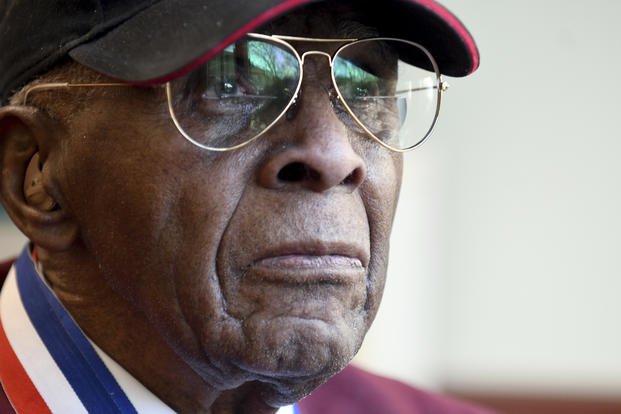Tuskegee Airman, 101, Speaks Out as Trump Scraps Diversity Programs
With the number of surviving Tuskegee Airmen dwindling, efforts to keep their legacy alive continue even as President Trump moves to eliminate diversity, equity, and inclusion (DEI) initiatives across federal agencies.
Col. James H. Harvey III, now 101, is one of the last remaining members of the legendary 332nd Fighter Group, also known as the Tuskegee Airmen. These Black pilots had to prove they were just as capable as their white counterparts in World War II. And prove it they did.
“They said we couldn’t fly, that we were inferior,” Harvey recalled. “We showed them.”
Harvey later became the first Black jet fighter pilot to fly combat missions over Korea, completing 126 missions and earning numerous awards. In 1949, he and three other Tuskegee Airmen won the first-ever U.S. Air Force Gunnery Meet essentially an elite aerial combat competition, a precursor to today’s “Top Gun” school. But for nearly 50 years, their victory went unrecognized, with the official records listing the winners as “unknown.”
Following Trump’s return to office in January, the Air Force abruptly removed training materials about the Tuskegee Airmen from new recruit programs, citing compliance with Trump’s executive order eliminating DEI initiatives. The move sparked bipartisan backlash, prompting the Air Force to restore the materials.
Air Force Chief of Staff Gen. David Allvin explained that the initial removal was due to the rush to comply with Trump’s orders, stating, “No foot-dragging, no slow-rolling.”
For Harvey, it’s a frustrating reminder of how progress can be undone. “I thought we were moving forward, but evidently, we’re not,” he said, blaming Trump for fueling division.
Asked if he would say that to Trump’s face, Harvey didn’t hesitate: “I’ll tell him, ‘You’re a racist.’ What can they do to me? Just kill me, that’s all.”
The Tuskegee Airmen, formed in 1941 at Alabama’s Tuskegee Institute, shattered racial barriers in the military. By the end of World War II, their unit had taken down over 400 enemy aircraft and even sunk a German destroyer. Despite their success, their contributions were largely ignored for decades.
Harvey, who retired from the Air Force in 1965, received an honorary promotion to colonel in 2023. While Trump previously promoted another Tuskegee Airman, Charles McGee, to brigadier general in 2020, Harvey remains unimpressed by Trump’s recent actions.
For him, the most important victory remains that 1949 gunnery meet. When the Air Force finally recognized the win in 1993, the missing trophy turned up in a museum storeroom.
“We were good,” Harvey said. “They couldn’t take it away from us. And I’ll keep saying that until the day I die.”
